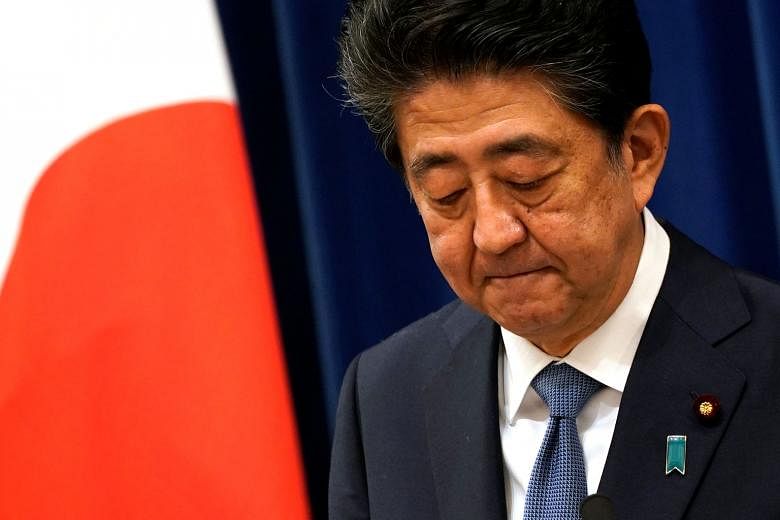His quavering voice betraying his stoic front, Japanese Prime Minister Shinzo Abe said yesterday that he saw no choice but to resign over his worsening medical condition.
"It has reached a point where I do not know if I can live up to the expectations of citizens," Mr Abe, who is three weeks shy of his 66th birthday, said.
He said his physical strength is not in top shape as he receives treatment for his illness - ulcerative colitis - and he wants to avoid "a situation where I make an error on political decisions and fail to deliver results". He also noted that there is no guarantee of a cure.
He said he found it painful to quit during the Covid-19 crisis, and before achieving his goals like resolving a decades-old abduction issue with North Korea.
But he said this is the best time to resign in order to avoid a "political vacuum", especially if Covid-19 cases were to surge in the coming months.
Mr Abe will stay on as prime minister until his successor is chosen from within the Liberal Democratic Party (LDP) next month.
His abrupt resignation drew messages of support for a speedy recovery from foreign leaders like German Chancellor Angela Merkel and Singapore Prime Minister Lee Hsien Loong.
China said Beijing will continue working with Tokyo to promote bilateral ties while South Korea, which has had a contentious relationship with Japan, expressed regret at the sudden resignation.
Mr Abe is quitting more than a year ahead of schedule, with his term as LDP president set to expire only in September next year. A Lower House election is due only by next October.
This is the second time he is stepping down prematurely over a flare-up of ulcerative colitis, a chronic inflammatory bowel disease that he has suffered from since he was a teenager.
When he first quit in 2007 after a year in charge, he became the first in a revolving door of leaders that saw six prime ministers in six years until 2012. The period also saw the ruling LDP cede power to the now-defunct Democratic Party of Japan for three years from 2009 to 2012.
Mr Abe's return to power in December 2012 marked the start of extended political stability. On Monday, he surpassed his great-uncle Eisaku Sato, who led Japan for 2,798 uninterrupted days from 1964 to 1972, to become the premier with the longest uninterrupted tenure.
It was also on Monday that Mr Abe cemented his decision to quit after consulting his doctors, he said yesterday. A relapse of his condition, which had been kept under control with medication, meant he is now on a new treatment that requires intravenous injections.
The plan was such a well-kept secret that it sent ripples through Japan's political circles, with even Cabinet ministers and top aides within the LDP blindsided.
The resignation as prime minister - Mr Abe will remain MP of his hometown constituency in the south-western prefecture of Yamaguchi and intends to run in the next national election - will intensify jockeying among potential successors in the LDP.
Among those who said they were keen on the top job yesterday were former defence minister Shigeru Ishiba, 63; former foreign minister Fumio Kishida, 63; and former internal affairs minister Seiko Noda, 59.
Others, like Defence Minister Taro Kono, 57, and Environment Minister Shinjiro Koizumi, 39, kept mum when asked.
Markets immediately reacted to news of Mr Abe's resignation, with the Nikkei 225 plunging over 600 points, or 2.6 per cent, to 22,594, before rebounding to close 1.4 per cent, or 326 points, lower. The yen, considered a safe haven in times of uncertainty, rallied against the dollar, hitting 106.11 from 106.74.
Mr Abe's support ratings have recently nosedived over a series of political scandals, and what has been judged to be poor handling of the coronavirus crisis.
SEE

